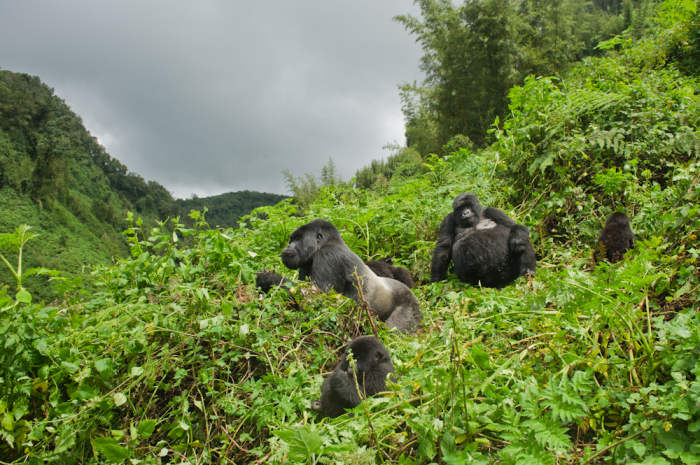Sustainable Travel Tips to Rwanda: The concept of eco-tourism has received a lot of attention in Rwanda in recent years with various programs being developed to practice sustainable tourism. This article addresses useful information about how the tourist can be an environmental enthusiast while enjoying his/her Rwandan experience.

About Eco-Tourism in Rwanda
Eco-tourism is tourism that takes place in the natural environment while seeking to minimize the adverse impacts of tourism activities on the physical environment as well as the cultural attributes of the host region. The Rwandese government accompanies booming tourism with eco-tourism since it’s the most encouraged kind of tourism in Rwanda, in their national parks such as the Volcanoes National Park and Nyungwe Forest National Park. These areas are not only meant to conserve the species but also have local peoples’ involvement in tourism projects within these areas.
Rwanda has adopted an ecolodges model that incorporates, responsible tourism, people and nature, and conservation awareness, as the travelers enjoy their holidays.
- Eco-friendly accommodation is what you should go for if you wish to make an environmentally sound decision.
Where to stay in Rwanda? It is always better to choose accommodation, which respects the environment and nature. The improved state of hotel management is in line with the adoption of environmental best practices like; solar energy, water, and waste management. By accommodating eco-lodges one minimizes negative impacts on the environment while helping the local population to create more job opportunities and develop conservation programs.
Some notable eco-friendly accommodations include:
– Bisate Lodge: This luxurious lodging service is constructed close to the Volcanoes National Park and its architecture is inspired by the surrounding savannah. Appreciation of Local Material and Labour: Implementing sustainable architecture and practice.
– Nyungwe House: This lodging facility is put up in Nyungwe Forest National Park and it has got stunning outlook as well as luxurious facilities. It encourages sustainability through façade and lighting techniques, and by forging links with inhabitants of the surrounding areas.
– The One and Only Nyungwe House: Just in front of the rainforest the setting of the property ensures a sensible way of giving our guests an experience of their lifetime. This lodge is an environmentally friendly establishment and is associated with the local community.
- Support Local Communities
Contact with the local communities is a centrality of eco-tourism in Rwanda as a country. Tourism: The community should encourage travelers to engage in community-based tourism, and support local artists with their products, and local restaurants. Here are ways to connect with local communities during your visit:
– Cultural Tours: Take a guided walk through cultural themes or try out the crafts and a glimpse of the local livelihood. Such tours provide real experiences as well as helping out artisans and those struggling within a community.
– Visit Craft Markets: Visit local craft fairs in order to buy some gifts and souvenirs. While buying from local artisans, people encourage the local artistic culture and at the same time are guaranteed that their money helps the community.
– Dining Locally: Select to use local restaurants and cafes because you will be able to taste traditional Rwandan meals. This is helpful to the local farmers and chefs while providing you with an opportunity to learn the culture.
- Enjoy Wildlife in a Responsible Way
Wildlife tourism has a great strength in Rwanda due to mountain gorillas and other animals that people can come to monitor. To ensure responsible wildlife tourism, follow these guidelines:
– Choose Ethical Tour Operators: Choose those tour operators who have a good policy of conservation and those who follow good ethics and best practices for viewing wildlife. Make sure they involve local people and are involved in environmentally friendly tourism.
– Follow Park Rules: When in national parks, respect all the laws and rules in force. Do not approach Wildlife and always preserve National Parks and reserves free from litterage.
– Gorilla Trekking Guidelines: If you go for gorilla trekking expect the following; It is wise to abide by the rules set down by the park rangers when in the forest. Some of the things to do and not to do include; refraining from having large groups of people, not being loud, and avoiding making uncomfortable eye contact with the gorillas.

- It’s also important to support the environment where we can.
As a result, the usage of environmentally friendly measures and practices when on a trip can greatly decrease the ecological impact of travelers. Here are some tips to minimize your impact during your trip to Rwanda:
– Reduce Plastic Use: Next, the best option is always to carry a travel bottle for water for refill during the tour to discourage the use of disposable plastics. Some hotels and lodges provide water that is safe for drinking by the customers.
– Offset Your Carbon Footprint: Think about such carbon offset programs that should be used to sponsor reforestation and renewable energy projects. This will go a long way in easing the carbon emitted through your travel.
– Travel by Public Transport: Try to walk where possible, take a bus, or car-pool to cut on emissions where possible works. The other environmentally friendly means of transport include bicycle rentals and walking.
- Contribute to Conversation Efforts
Rwanda presents several options for any traveler to participate in ecologic conservation and protection endeavors. Participating in these activities enhances your travel experience while supporting local conservation initiatives:
– Tree Planting Initiatives: Plant new trees within that geographical region through participation in tree planting exercises aimed at restoration of forests and fighting deforestation. Several organizations provide tourists with volunteering activities for participation in environmental conservation.
– Wildlife Conservation Projects: Engage in wildlife conservation activities, for example through census or as a volunteer in educating the community. All these projects are practical ones that are beneficial for the participants and save Rwanda’s natural resources.
- Respect Cultural Heritage
Rwanda is blessed with several cultural activities and since we’re on a green tourism conservation, it is of great importance that we respect the Rwandan culture. Here’s how to engage respectfully:
– Learn Basic Kinyarwanda Phrases: It is always important also to learn at least a few basic Kinyarwanda phrases to help embrace the local language. Preliminary contact can involve basic means of greeting that will create favorable interactions with locals.
– Engage with Local Customs: Use the liberty and accept proceedings concerning the customs, festivals, and ceremonial functions going down around you. Adopt cultural practices because they create cultural relevancy with the community that one is working with.
– Capture Memories Responsibly: In any cultural event, always seek permission before snapping shots at any particular incident. Additionally, cultural sensitivity and respect for the people an individual interacts with are important.
Conclusion
Before you start your tour through Rwanda, the Land of a Thousand Hills, ensure that eco-tourism is not just a means to enjoying the scenic beauty of the country but also a way to help preserve the environment of the countries you visit and their people. By adopting these sustainable travel tips you will assist in making sure that Rwanda remains a lovely and active destination for other generations to come.


